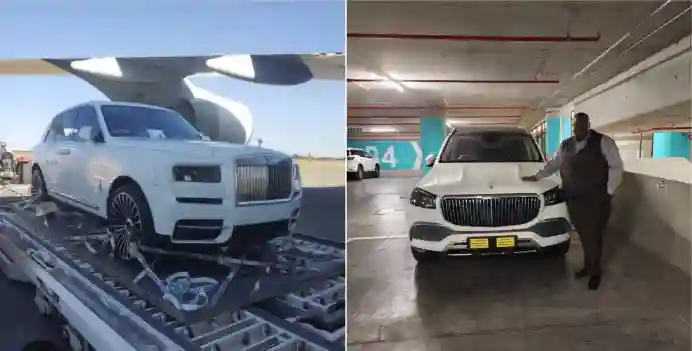Zimbabwean businessman Wicknell Chivayo recently purchased three luxury vehicles: a 2023 Maybach Benz GLS600 for US$400,000, a 2023 Rolls Royce Cullinan for US$850,000, and a Rolls Royce Ghost for US$700,000, bringing his total expenditure to US$1,950,000.
This comes amid anger from members of the public over the multi-million dollar 100MW Gwanda Solar Project which has failed to take off since 2015.
Chivayo, an ex-convict, blames his company’s failure to complete the project on a nine-year-long court battle between him and the government after power utility ZESA tried to terminate its contract with his Intratek.
Gwanda Solar Project Timeline:
In 2013 Zimbabwe Power Company (ZPC) — a subsidiary of ZESA Holdings floated a tender for the installation of 100MW solar power stations. Intratek reportedly bid but lost. However, the terms of the tender were changed to allow Intratek (together with Chinese company ZTE) to be accepted and supply the solar stations.
It was alleged that the initial partners, Greenfield Solar of Germany, did not have the financing for such a project, after having been awarded the tender. They would later enter into a partnership with a Chinese company, China Electric Company, to build a now even bigger power station, said to be at the tune of US$750 million in Gwanda.
In 2014, Chivayo’s Intratrek partnered with Green Solar Europa to build a $350 million solar power station. However, China Jiangxi Corporation won the contract with a bid of $184 million.
ZPC demanded that Intratrek partner with Jiangxi, who had won the contract. Intratrek and ZTE then lowered their initial bid of $248 million to match Jiangxi’s price.
The State Procurement Board later cancelled Jiangxi’s contract, alleging that they had raised their price. Intratrek was eventually awarded the contract for $202 million, although the initial reported price was $171 million, and there is no explanation for the $30 million difference or the multiple changes in the project’s cost.
Intratrek Zimbabwe won the bid for the 100MW Gwanda Solar Project in 2015 and received $5.6 million in advance payment for preparatory work. However, legal disputes have prevented the project from being implemented. ZPC cancelled the tender after Wicknell had failed to meet the set deadlines.
2023: Chivayo won the prolonged fraud legal battle.
The Magistrate ruled that Chivayo had not defrauded ZPC since in another case, the power company had denied complaining against Chivayo. The Magistrate added that Cabinet, the State’s highest decision-making body, ordered on June 30, 2022, that the contract between Chivayo and ZPC is valid and must be carried out. The magistrate added that the Cabinet’s decision is public knowledge and endorses the continuation of the project.
The magistrate noted that a jointly carried out and ratified report on the pre-commencement works, evaluated on July 13, 2020, confirms that Chivayo and Intratek fulfilled their contractual obligations and even used their own resources to complete some of the required works. The report clears them of unfounded allegations of short-changing or defrauding ZPC. The report confirmed that as of July 13, 2020, ZPC owed Intratrek US$609 693.87 for work that had been overdelivered.
The magistrate added that while the significance of the 100MW Gwanda Solar Project for Zimbabwe is crucial, given the frequent 16-hour load-shedding power shortages, the contract between Chivayo and ZPC should be the starting and ending point. The magistrate noted that Chivayo did not violate the contract as he was supposed to deliver after all payments had been done. He only got an advance, used his own money for some work and is actually owed by ZPC.
This is happening when Zimbabwe is currently experiencing a severe power shortage caused by ageing power generation equipment, corruption, and irregular rainfall.

